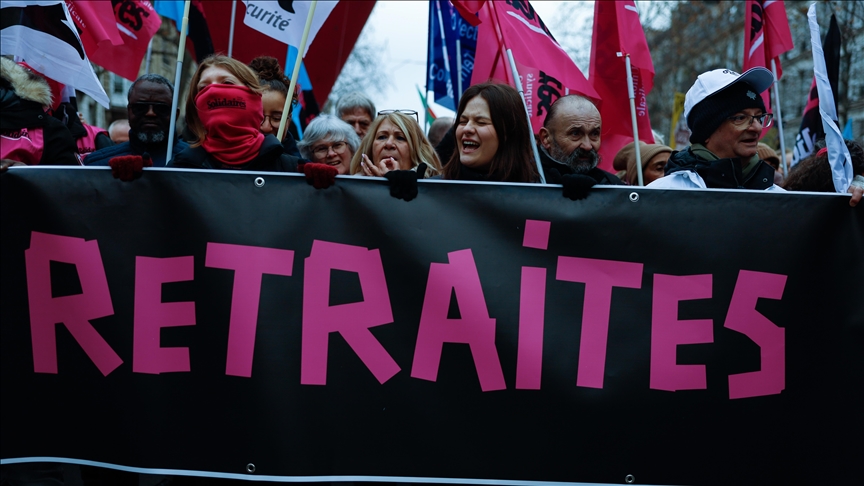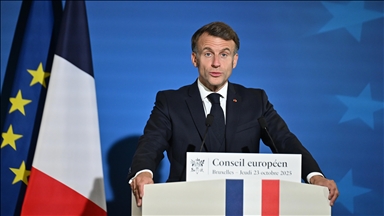France’s new prime minister pushes for pension reform amid strong opposition
'If we find ourselves with negotiations that result not in complete agreement but in partial agreements, we will also include them in a bill that will be presented to parliament,' says Francois Bayrou
 People gather to demonstrate against pension reform in Paris, France in January, 2023
People gather to demonstrate against pension reform in Paris, France in January, 2023
ISTANBUL
French Prime Minister Francois Bayrou defended the government's pension reform plans before France's upper house, or Senate, on Wednesday, emphasizing dialogue with unions and employers while facing criticism from opposition parties.
Bayrou confirmed that discussions with social partners would begin on Friday to seek alternatives to the 2023 pension reform.
“If we find ourselves with negotiations that result not in a complete agreement but in partial agreements, we will also include them in a bill that will be presented to parliament,” he said.
“Democracy will have the last word, and it is good that it is so,” he added.
However, the Socialist Party (PS) voiced dissatisfaction with the approach. “The account isn’t there," PS First Secretary Olivier Faure said.
Patrick Kanner, leader of Socialist senators, agreed, saying, “It would be intolerable to return to the 2023 reform. The Parliament must imperatively have the last word and debate all options, particularly the legal retirement age and contribution period.”
Centrist senators, led by Herve Marseille, called for collaboration with the “republican left” to reduce reliance on the far-right National Rally (RN). Marseille stressed the importance of addressing key issues such as stabilizing the national budget and supporting overseas territories.
“No a priori rejection, no unconditional support,” said Les Republicains Senate leader Mathieu Darnaud. He emphasized the need for effective solutions while reaffirming the party’s opposition to tax hikes.
Bayrou dismissed concerns that employers’ organizations might undermine the negotiations, saying, “I don’t believe the claims that business groups aim to derail these talks.”
He suggested that partial agreements could still be legislated to ensure progress.
On Tuesday, La France Insoumise leader Mathilde Panot filed a censure motion against Bayrou’s government, supported by 57 deputies, including communists and ecologists.
The motion is set for debate on Thursday, with the PS undecided on its stance.
France's political turmoil
The debt issue and budget talks, particularly the social security budget bill, were the reason Bayrou’s predecessor, Michel Barnier, and his Cabinet were toppled on Dec. 4 after less than four months in office.
The no-confidence vote on Dec. 4 came two days after Barnier used his discretionary powers to pass the contentious Social Security budget bill without a vote in parliament.
After the government collapsed, President Emmanuel Macron announced that a special budget law should be debated and adopted by lawmakers before beginning work on a new budget for 2025.
Bayrou was appointed prime minister on Dec. 13. Opposition parties, particularly the left-wing party France Unbowed (La France Insoumise or LFI), vowed to submit no-confidence motions against Bayrou's government, and the first motion is expected to be voted on this week.
The country has been in political upheaval since June when Macron's centrist bloc failed and the far-right National Rally (RN) party won the European Parliament elections.
In response, Macron called for two rounds of snap parliamentary elections on June 30 and July 7, but no party won 289 seats, a threshold to achieve an absolute majority in the National Assembly.
The left-wing alliance New Popular Front (NFP) won the most votes and seats in parliament in the second round and later insisted that the prime minister must be from the alliance, but it failed to nominate a consensus candidate for the position immediately.
After weeks of internal divisions, the NFP nominated Lucie Castets for prime minister on July 23.
However, Macron rejected a left-wing candidate and said he would not appoint a premier until mid-August after the Paris Olympics.
He faced criticism for delaying the process, fueling further instability after he accepted then-Prime Minister Gabriel Attal's resignation on July 16 after initially rejecting it on July 8.
On Sept. 5, Macron finally appointed Barnier, a center-right politician, former European commissioner, and former foreign minister, as prime minister.
Barnier's government became the first one to collapse with a no-confidence vote since 1962 and only lasted three months.








